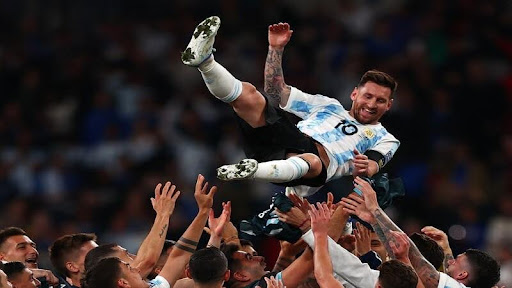
Argentina’s triumph at the 2022 World Cup felt like a story written by destiny. The team carried more than tactics or talent; it was faith and ritual that shaped their spirit. Fans around the world followed every match live on Xoilac https://xoilaczzzez.tv/ , witnessing a nation’s belief turn into victory.
The spiritual undercurrent in Argentina’s World Cup journey
Argentina’s road in Qatar was filled with emotion, belief, and silent prayers. Behind every goal was an invisible layer of faith that gave strength when pressure rose.
Messi’s quiet devotion and symbolic gestures
Messi — more than a footballer, a national symbol
Lionel Messi never shouted his faith. His devotion showed through small gestures. He looked up to the sky after each goal, kissed his medal, and whispered short prayers before kick-off. These habits created calm in moments of tension.
In Argentina, people saw Messi as more than a player. He became a vessel of belief. His teammates followed his quiet energy, trusting that destiny would guide them when football logic failed.
See more: https://xoilaczzzez.tv/lich-thi-dau/
Prayers, medals, and the power of personal belief
Inside the Argentina camp, faith was everywhere. Emiliano Martínez carried an amulet from his wife and child. Ángel Di María touched his cross tattoo before every match. Even Scaloni had his own routine of silent thanks.
These were not random actions. They were anchors of belief. Players held onto them when facing pressure from France or the roaring crowd at Lusail. The rituals gave them emotional control when the game demanded courage.
The emotional link between team and nation
Faith in Argentina is a collective experience. When the anthem played, players closed their eyes while millions at home sang with tears. Churches filled during matches.
It felt like the team and the country shared one heart. The fans’ chants became prayers, and the players’ goals became answers. That connection gave Argentina strength in ways no tactic could explain.
Rituals that defined Argentina’s road to the trophy
Rituals can sound simple, but in football they become a mental pattern. Argentina’s rituals, from daily habits to pre-match moments, created rhythm and confidence.
Coach Scaloni’s subtle patterns and unspoken rules
Lionel Scaloni may appear calm, but his routines were precise. He often started training at the same hour. He arranged lineups in consistent order. The staff followed a quiet pattern that the players respected.
These habits gave comfort. In a long tournament, stability matters. The repetition helped the squad feel protected, like following a sacred rhythm.
The lucky jerseys and everyday superstitions
Superstition runs deep in Argentine culture. After each victory, the team kept the same kit combination. Di María refused to shave before the final. Some players entered the field in the same order.
Fans did their part too. Many wore the same shirts, sat in the same spot, or cooked the same meals on matchdays. These shared habits built an invisible bond between team and supporters, as if repeating luck until it became truth.
Shared moments before kick-off
Before every match, Argentina formed a tight circle. Players held hands, whispered prayers, and looked into each other’s eyes.
Those brief seconds were powerful. They reminded everyone of purpose and brotherhood. It wasn’t strategy. It was surrender to something higher. Each man stepped onto the pitch believing fate had chosen them.
Fate and the feeling of inevitability in Qatar
Every great story needs tension and redemption. Argentina’s campaign felt destined from the moment they fell and rose again.

From heartbreaks to glory — Argentina lift the World Cup in Qatar
The redemption arc after Saudi Arabia
The loss to Saudi Arabia in the opening match was shocking. It tested belief and unity. Many teams might have broken under that pressure. Argentina used it differently.
After that defeat, players gathered in silence. They spoke about destiny, about patience, and about trust. Each match that followed looked like a step of rebirth. Fate, it seemed, demanded a trial before glory.
Messi’s final dance with destiny
By the knockout rounds, Messi looked lighter, as if every touch carried fate’s blessing. Against Croatia, he danced through defenders. Against France, he led like a prophet fulfilling a promise.
His gestures to the sky after every goal spoke to something personal. It was gratitude, memory, and belief rolled into one. Messi wasn’t chasing legacy. He was walking the path that destiny had written for him years ago.
Faith meets football in the final
The final against France was chaos and beauty. Mbappé’s hat-trick tested every nerve. But Argentina’s response came with calm belief.
When Gonzalo Montiel scored the winning penalty, players dropped to their knees. Many crossed themselves, others cried, and Messi raised his arms to heaven. It felt like a divine moment. Faith had met football, and destiny had spoken.
Conclusion
Argentina’s World Cup victory in Qatar was more than a sports achievement. It was a spiritual triumph built on faith, ritual, and destiny. Every gesture, chant, and prayer connected players and fans into one heartbeat. In that unity, belief became power—and belief made them champions.
